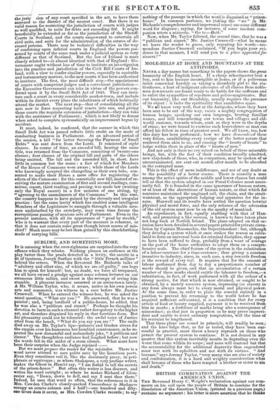SUBLIME, AND SOMETHING MORE.
Fr is amusing when the over-righteous are surprised into the very offence which they rebuke. Nothing pleases an audience at the play better than the prude detected in a levity, the ascetic in a fit of tipsiness, Joseph Surface with the "little French milliner" behind the screen. When the Reverend Mr. Richards talks of "adultery and other sins, of which we are all guilty," one begs him to speak for himself: but, no doubt, we have all trespassed, we all have owned a grudge against some solemn lecturer on our erroneous little sallies, and sweet is the revenge of seeing him stumble. A pleasant instance occurred at an assize-town lately. A Mr. William Taylor, who, it seems, unites in his own person arts and commerce, was witness in a case before Mr. justice Cresswell. When he entered the witness-box, he was asked the usual question, What are you ?" He answered, that he was a painter ; and, being landlord of a public-house, he added, that he was also a "publican and sinner." Perhaps he thought his devotion to lucre in such a channel rather derogatory to the higher art, and therefore disguised his reply in that facetious form. But his pleasantry could not be tolerated : the awful voice of Justice cried from the bench, "What do you say you are ?" The smile died away on Mr. Taylor's lips—paleness and blushes strove for the empire over his humorous but humbled countenance, as he re- peated the now distasteful and melancholy joke, "A publican and 'sinner." The thoughtless audience had laughed before ; but now the words fell in the midst of a stern silence. What must have been their surprise when the Judge rejoined —
But we must prepare the reader for the rejoinder. There is a word never uttered to ears polite save by the licentious poets. Even they sometimes veil it, like the decorously prosy, in peri- phrasis or equivoque ; as where Shakspere, a very profane writer, makes the Ghost in Hamlet say, "I am forbid to tell the secrets of the prison-house." But often this writer is less discreet, and writes the word outright ; as where he makes Richard of Glou- cester say, "Down, down to hell, and say I sent thee there." Indeed, he uses that word so often, that the references to it in Mrs. Cowden Clarke's closely-packed Concordance to Sh,akspere occupy an octavo column and a half I—one hundred and fifty- one times does it occur, as Mrs. Cowden Clarke records ; to say nothing of the passage in which the word is disguised as "prison- house." In common parlance, we (taking the " we " in Mr. Richards's comprehensive and impersonal sense) use some different word for disguise ; saying, for instance, if some insolent com- panion utters a niaiserie, "Go to—Bath." Now, when Mr. Taylor faltered, the second time, that he was a "publican and sinner," Mr. Justice Cresswell—what he meant we leave the reader to guess, only repeating his words—tre- mendous Justice Cresswell exclaimed, "If you begin your evi- dence in that manner, I will send you to a place -appointed for sinners ! "


























 Previous page
Previous page